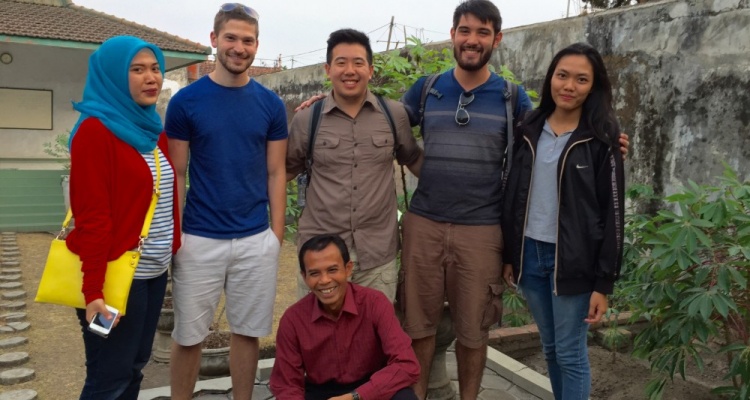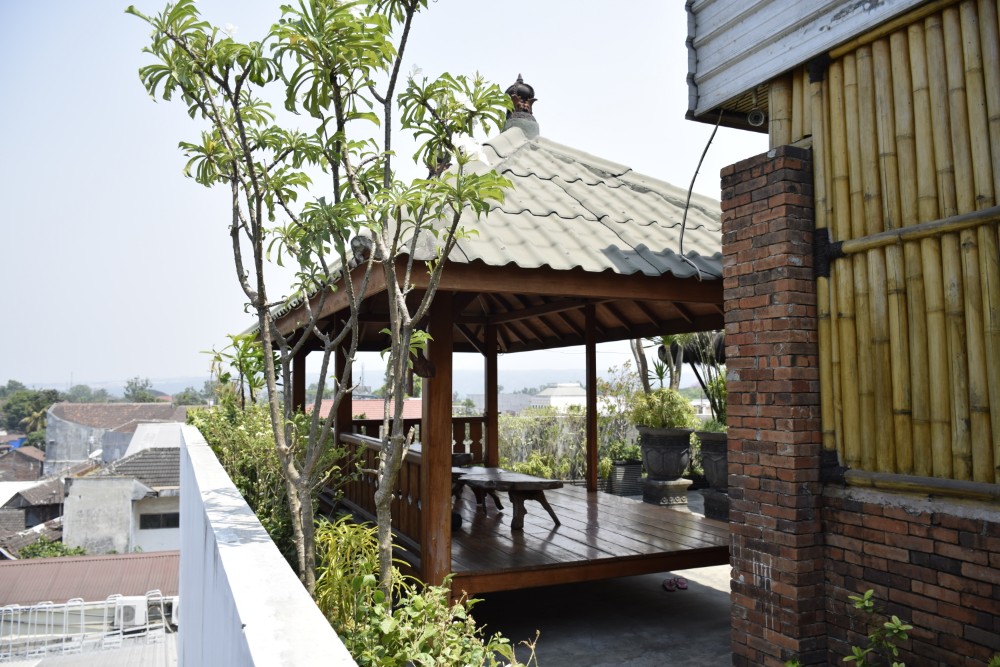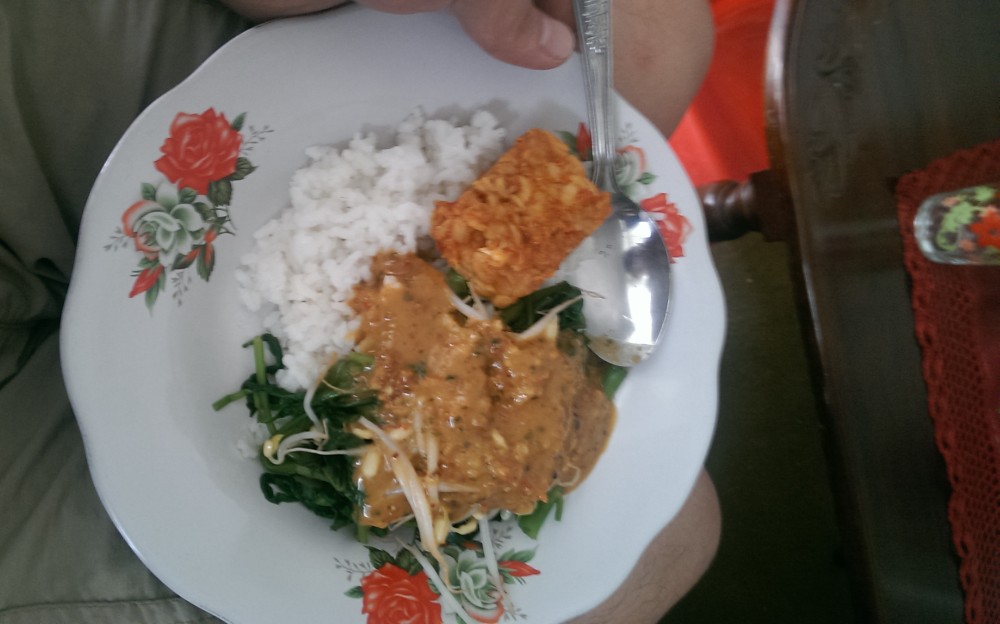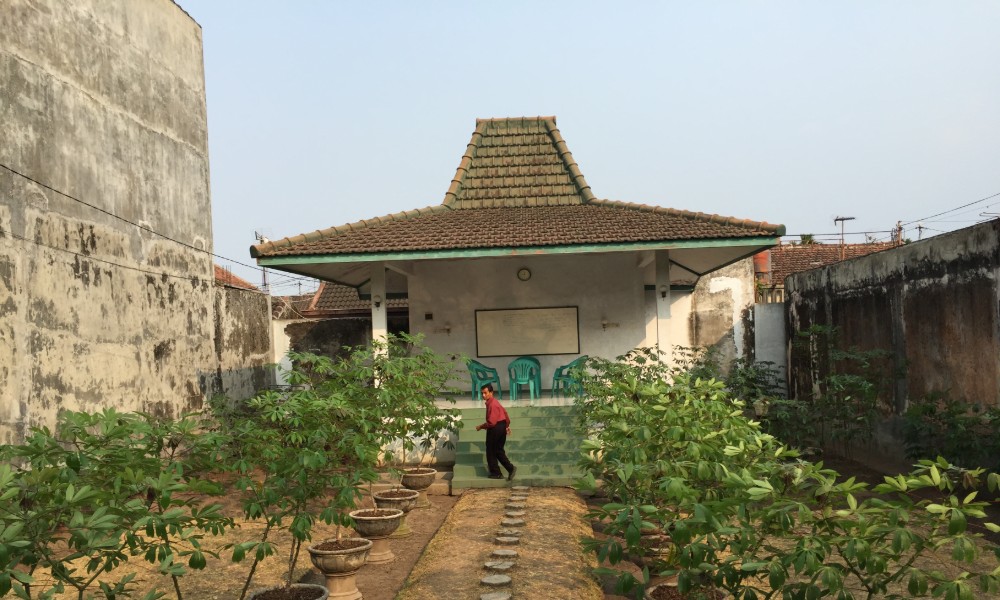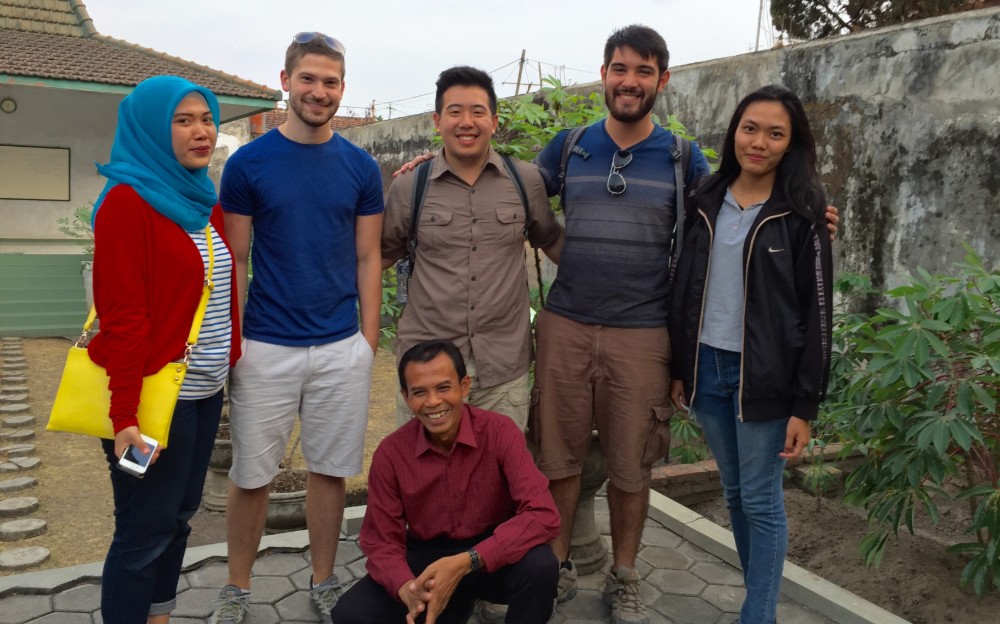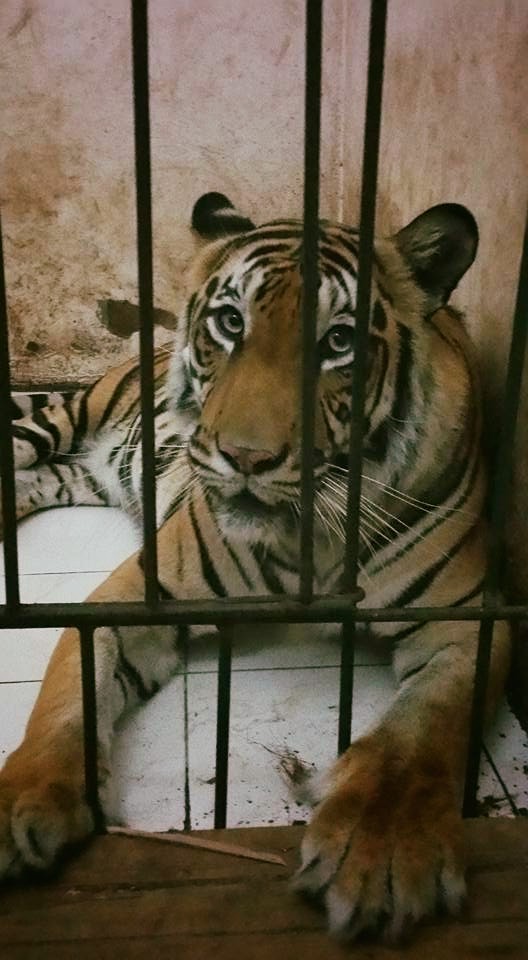How it Began
Our feet dragging, Mike, Dan and I walk ourselves up to the front desk and ring the bell. We look unkempt — dirty, smoky & stinking of sulfur — tired and ready to collapse onto a bed. We’d just returned from our hike on Mount Bromo (one of the most-visited attractions in East Java, Indonesia) that morning, and while we were still running on endorphins from the trek, we were desperate to get into beds that weren’t infested with bed bugs, as our hostel ones were the previous night. A friendly woman smiles at us and checks us into a last-minute opening at her hotel, a rare stroke of luck for this time of year in Malang, Indonesia. We pick up our backpacks, ready to see our room when a man walks up to us and says “hi” in perfect English. He’s short and slight, maybe in his 50’s, with black hair. He looks very put together; his red button-up shirt is spotless and wrinkle-free, and his smile is warm and contagious.
“Hi,” we respond, half-engaged and ready to see our hotel room. “What are you three doing today?” he asks quickly, sensing our reluctance. I’m not having it. I’ve seen this before. A stranger approaches you on the street, asks you friendly questions about where you’re from, and once you’ve formed a connection, hits you with the sales pitch. Mike and Dan are less skeptical. They tell him we just got back from our Mt. Bromo hike and plan to spend the day recovering. He informs us that he’s an English teacher in the neighborhood, and always checks hotels like these for friendly tourists who’d be willing to meet his students. He continues to explain that he can provide us with a full day’s worth of activities for free and that we would be face to face with a tiger by the end of the day. My red flags are firing off on all cylinders at this point. I’ve heard this story before. Tourists go off with a local for an “authentic” experience and end up dead or kidnapped. I look expectantly at Mike and Dan, trying to gauge where they’re at with his pitch. We’re waiting for the catch.
“No catch,” he says through what seems to be a genuine smile. We thank him for his time and tell him we’ll consider it, but that we’d love to go rest up for the day. He says “no problem” and introduces himself as Mr. Tasi. He says to come to the front desk at 7:00 AM the following morning if we’d like to join him for the day. We say bye and shuffle off to our room.
The day is spent laying in bed, snacking on Indonesian junk food from the market, and watching Indonesian soap operas on TV. We discuss the pros and cons of Tasi’s offer and debate whether or not it would be worth it. Finally, after agreeing that a reputable hotel wouldn’t allow a scammer to hang out at its front desk, we decide to go along with it. We rest up, shower, and head to sleep early.
The Next Morning
We wake up early the following morning, shower and have a quick breakfast at the hotel lobby. Rushing to grab our packs, we head over to the information desk to meet up with Tasi. He’s standing there, once again, looking very put together. He beams when he sees us, and welcomes us warmly, thanking us for agreeing to his itinerary. We follow him outside and around the block as he hails a tuk tuk. Still unsure of where we’re headed, the three of us get in the cab and squish together in the all-too-familiar metal cube that’s clearly not built for four.
Mr. Tasi, holding onto the side of the cab for support, begins explaining our day’s itinerary.
- Go to his house & have lunch
- Join him in the mosque while he prays
- Teach at his English school
- Teach at the other school he works at
- See a tiger
It’s difficult to ignore the elephant — or tiger — in the room; the one activity that doesn’t fit in with the rest, but Mr. Tasi dismisses our concerns. He waves his hands and says that we’re in for a really great day. We nod, half excited, half concerned, as the tuk tuk stops.
Mr. Tasi’s House
We get out of the tuk tuk on a suburban street, obviously far from the city center. There are houses everywhere, small and gated, and pressed tightly next to one another. It’s quite clear this is a lower-middle-class neighborhood; some of the roofs are patched together with aluminum plates, and there are chickens clucking about on the sidewalks. We follow Tasi’s brisk pace down a side street and stop at one of the houses. It’s freshly painted and in good condition. You could tell it was his just from the exterior. We slip off our shoes and head inside.
The house, unsurprisingly, is tidy and well-kept. There are Muslim psalms framed on the walls, and pictures of what I assume are ancestors on every tabletop. Tasi points us to a couch in the living room and introduces his wife. Like him, she’s slight and small. She’s covered with a hijab and has a warm smile of her own. She walks into the kitchen and returns with four plates of Nasi Goreng, a dish we’re quite familiar with. We’ve had it for almost every meal in Indonesia. But my God was this one spicy. Politely hiding our melting lips, we chat with Tasi about where we’re from, what we do, and how we’re enjoying his country so far. You can tell he gets a lot of guests like us, but he’s remarkably good at showing interest and treating us like the first ones.
We finish up our lunch, down a glass of water to cool the heat in our throats and wait patiently as Tasi changes into his prayer clothes. He leads us out the sliding door, we grab our shoes and head down the block.
The Mosque
Tasi’s mosque is anything but showy. It’s an unassuming concrete building pressed between two houses, unfinished and undecorated. He tells us, as he’s rolling out his prayer mat, that the building is under construction and will be really grand and beautiful once it’s finished. He seats us on the stairs facing the window and he begins praying. Having never seen this before, and having grown up in Israel, this was particularly interesting for me. I’ve never been inside a mosque at all, let alone during a prayer service. Tasi finishes up rather quickly and changes back into his street clothes. We leave the mosque and walk a few blocks over to the first of his two schools.
Tasi’s English School
Just a few blocks away, we come to a clearing in the densely packed street. Flanked on both sides by rows of potted plants is a raised tile floor sitting under a black shingled roof. It’s bare bones for sure, but it’s nice — clean, tidy and orderly, just like the carefully arranged plants around it. In the covered terrace are ten plastic chairs — the kind you’d find at Costco or a barbeque– and a whiteboard. As we walk through the garden, Tasi tells us about the property. He funded the whole school on his own — the land, the construction, the maintenance — and doesn’t charge students or their parents to study with him. To him, he says, it’s important that the kids learn English so that they can open the doors to better and higher-paying careers when they grow up.
We wait around a while, enjoying the late afternoon sun when Tasi’s students start showing up. Eight kids, ranging from ages 12 to 18, greet us one by one with limited and broken English. You can tell immediately from their body language that they treat this like an obligation – the way you would an after-school job or volunteer work. Teenage angst, it seems, is an international phenomenon.
We sit down in a circle and Tasi introduces everyone — us to the students and the students to us. He asks that we all speak English the entire time, and begins his rounds with the kids, asking them simple questions like “how are you today,” and “what is your favorite food?” The kids respond impressively well, with most having near-perfect grammar. Tasi then asks Dan, Mike and I to each explain our careers back home and tell the kids how much money we make. I’m a bit taken aback. At home, it would be really rude to put someone on the spot like this, but it quickly becomes clear, as Tasi calculates the exchange rate for his kids, that this is meant to incentivize them. He wants them to know how useful English can be — how if they work hard and study English, maybe they can make it to the US and get paid a salary they’d never come close to seeing in Indonesia. The kids seem really engaged at this point in the lesson, and Tasi chooses to end on a high note. We thank the kids one by one and shake their hands, and they take off home.
The Prep School
Without much explanation, Tasi herds us into another tuk tuk. We didn’t really get to this part of the itinerary during the explanation, so Dan, Mike and I shrug to each other. We’ve made it this far without being kidnapped. Might as well ride it out.
After 30 minutes of driving, we arrive at what looks like a prep school. Teenagers — kids no more than 5 years younger than us — armed and dressed in uniform, open the gates for us, and we drive in. My heart starts racing. This is it. This is the part where we die. We get out of the car.
Tasi greets us once again with his warm grin and walks us over to a table in the courtyard. The school is impressive — three floors of brick surrounding a massive concrete courtyard. We’re seated at the table and are met with a smile and a handshake from another Indonesian man. You could tell immediately that this guy owns the place. He radiates money. Imposing but kind and wearing a purple sarong, he shakes our hands and takes a puff of his vape. Using Tasi as his translator, he asks us the usual questions — where are we from? What do we do? How do we like his country? And he repeatedly asks us our impression of his school. Politely and apprehensively we say that it’s lovely, not exactly knowing all that much about it. But as the questions keep coming, Tasi whisks us away to teach another one of his classes.
In a similar fashion, this class is comprised of plastic Walmart chairs seated in a circle. The kids, this time dressed in uniform, come join us, and we repeat the steps we did earlier in the day.
“How are you today?”
“What is your favorite food?”
“What do you do?”
“How much money do you make?”
Only this time Tasi asks us about our hobbies lights up when Mike and Dan mention that they love music. Grabbing a guitar, he asks them to play a song for the kids. After playing Dave Matthews (which apparently isn’t played out yet in Indonesia), the kids erupt in applause. It’s almost weird to see the kids act like kids — the good behavior and dress code make it easy to forget their age. Finally, we finish up the class and thank the students one by one again in English, and Tasi scurries us back to his boss.
The Tiger
At this point it’s close to 9:00 and I’m starting to get concerned. The day’s been incredible and unexpected, but I’m starting to get the itch to head back to the hotel — and by the looks of it, Dan and Mike are too. There’s still one thing on the list, however: the tiger.
Boss-man chats us up again, asking us our impression of his school and his children’s English skills, but Tasi, maybe noticing my leg nervously twitch under the table, speeds things along and asks him about the tiger. Nodding and waving us along, he takes another puff of his vape, tells us to head the back of the courtyard, to a padlocked door. Tasi gives us a brief warning that even though the tiger is blocked off by a gate, we should be careful not to frighten or excite her. We nod, slip off our shoes and go inside one by one.
The inside is anything but impressive. Dingy, dirty and small, it’s essentially a dimly lit and glorified closet. A long-haired shirtless boy greets us, and weirdly enough, he looks familiar. I’ve seen him before. Where and how could I have seen him before? And then it hits me. I watched a documentary a few months ago about a boy who grew up with a pet tiger. And incredibly, this is him – Abdullah Sholeh. Abdullah speaks no English but shakes our hands and smiles a toothy grin. It’s at this point I notice a huge five-foot hole in the wall. Abdullah calls loudly and motions for us to step back. A huge, full-sized and beautiful orange tiger wanders into the room on the other side of the gate. She paces back and forth, examining us. Tasi explains that her name is Mulan and that she lives on the property and wanders around the attached field at her leisure but always responds to the boy’s call because their bond goes way back. Abdullah often chooses to sleep next to her, he explains and even lets her eat out of his mouth. Dan, Mike and I are all but stunned, snapping pictures of Mulan and resisting the urge to pet her enormous paws that are sticking out of the gate. “She wants to play with you,” Tasi explains, but we think it’s best to keep the three-foot distance. After ten minutes, the boy starts to usher us out, and we head back to the boss’ table.
The Ride Home
At this point, Dan, Mike and I are wiped. We’re ready to head home. We thank Boss Man and the students, and they have us sign a visitors book before heading off. Grabbing another tuk tuk, Tasi ushers us one more time inside and we start heading home. Out of seemingly nowhere, he pulls out a paper bag that smells vaguely of…McDonald’s? All three of us perk up. We haven’t eaten since lunch at his house earlier that day. Tasi explains that he tries to bring good to the world and sometimes the world rewards him with fried cassava. He passes it around and we nibble on some of the best french fries of my life as we drive another 30 minutes home. We get out of the tuk tuk at our hotel and give Tasi a big hug. We thank him for showing us a part of Indonesia we didn’t think we’d see, and he thanks us for humoring his convoluted itinerary. Feet dragging once again, we head to the front desk and ask for our room key.
Want to read more stories like Gilad’s? Find dozens of articles celebrating the journeys, histories, and experiences celebrating Asian Pacific American Heritage month on our blog!

